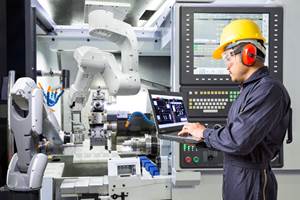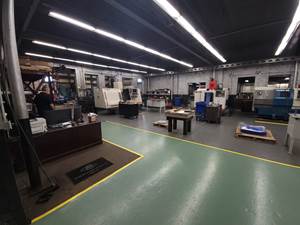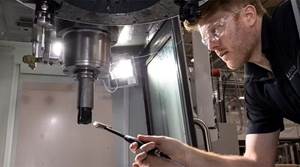Valid Data Demanded
The only way to make quick evaluations in near real time and reliably communicate the results is by recording valid data with Cyber-physical systems (CPS).
Share





Nowadays, everyone is talking about big data, and this topic finds its way into discussions of industrial production, too. The underlying concept is perfectly clear. It is possible to record great volumes of data quickly and automatically, and store it cost-efficiently in remote memory banks. At the same time, global communication options have increased enormously due to the Internet. As experience with social media shows, the willingness of users to allow personal information to be included in this data seems unlimited. Big companies such as Amazon, Apple, Facebook, Google, eBay and so on are eager tap this treasure trove as they develop new business models for marketing products and services.
In industrial production, it is particularly important to record valid data and to use a clear structure to store them. This is the only way to make quick evaluations in near real time and to communicate results reliably. Industry 4.0 is frequently discussed in Germany and even supported by the government as a way to best make use of this data. Germans actually mention the chronology of the last three industrial revolutions in this context and speak about a looming fourth industrial revolution.
The need to produce customized products and to make them ready for the market as quickly as possible requires flexible and efficient development and production processes. This approach is particularly important in high-wage countries. Manufacturers can reach these targets by leaving behind today’s inflexible supply chains and turning to an interconnected world where costs will be lower.
Cyber-physical systems (CPS) are the technology required by an interconnected world. These systems integrate computation and physical processes. Embedded computers and networks monitor and control the physical processes, with feedback loops where the physical processes affect computation, and vice versa.

Cyber physical systems (CPS) enable a manufacturer to move away from a hierarchical structure for the automation of data collection and distribution. This shift helps companies respond to data quickly on the most appropriate level.
When a production system becomes nearly self-regulated, automated decision-making has to be based on quality parameters, because the products themselves define the characteristics to be processed and the way they must be processed. Specifying the equipment or tool to produce the characteristics also determines the respective process parameters. So manufacturers need to create databases containing essential information about the capability of measurement processes, the qualification of machines and production facilities, the best possible process parameter settings, and the expected lifetime of products. In order to create an information platform, it is important to define uniform and company-wide evaluation rules. International standards, company guidelines and manuals should be applied in these rules.
While these standards and guidelines will guarantee uniform rules company-wide, they will also enable suppliers to present their processes transparently to customers all over the world. This is not only important for traceability in case of complaints, but it will also allow supplier integration into the production chain to continue to gain in importance.
As one example of quality-related data integrated throughout the production control network, we point to software packages (procella, O-QIS, solara.MP, qs-STAT and destra), which are designed to meet the requirements of data-driven manufacturing. O-QIS and procella record data from various sources, consolidate them and maintain quality control charts. In the next step, solara.MP and qs-STAT evaluate variable and attribute measurement processes, and establish the capability of machines and production facilities. Finally, destra helps to optimize products and processes and determine the expected product lifetime.
These software packages also interact with M-QIS to implement a performance measurement system to assess quality. It uses a dashboard to show the required information in real time. The entire system includes an automated flow of information. Likewise, the communication and visualization of results are automated to a great extent.
Just as data derived from social media may reveal trends in personal preferences and interests, data from manufacturing will identify the processes contributing the most to quality and value.
Related Content
6 Machine Shop Essentials to Stay Competitive
If you want to streamline production and be competitive in the industry, you will need far more than a standard three-axis CNC mill or two-axis CNC lathe and a few measuring tools.
Read MoreFrom Tradition to Transformation: Century-Old Manual Machine Shop Adds CNCs
After 122 years of working with manual mills and lathes, this fifth-generation shop acquired assets of a local CNC machining business and hired the owner. Here’s how it’s going a year later.
Read More4 Commonly Misapplied CNC Features
Misapplication of these important CNC features will result in wasted time, wasted or duplicated effort and/or wasted material.
Read MoreHow to Mitigate Chatter to Boost Machining Rates
There are usually better solutions to chatter than just reducing the feed rate. Through vibration analysis, the chatter problem can be solved, enabling much higher metal removal rates, better quality and longer tool life.
Read MoreRead Next
A New Frontier in Surface Finish Control
What if your machine tool could measure surface roughness as it cuts? This article explores how in-process metrology is advancing from concept to reality, enabling real-time feedback, immediate detection of anomalies and new levels of control over surface quality. Discover the technologies making this possible.
Read MoreHow I Made It: Dennis Rymanowski
Dennis Rymanowski has worked at NSH USA for 60 years, with his passion for manufacturing living alongside his passion for his family’s polka band.
Read More


















